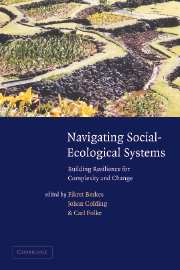Book contents
- Frontmatter
- Contents
- List of contributors
- Preface
- Acknowledgements
- Foreword: The backloop to sustainability
- 1 Introduction
- Part I Perspectives on resilience
- Part II Building resilience in local management systems
- Part III Social-ecological learning and adaptation
- Part IV Cross-scale institutional response to change
- Index
Part I - Perspectives on resilience
Published online by Cambridge University Press: 13 August 2009
- Frontmatter
- Contents
- List of contributors
- Preface
- Acknowledgements
- Foreword: The backloop to sustainability
- 1 Introduction
- Part I Perspectives on resilience
- Part II Building resilience in local management systems
- Part III Social-ecological learning and adaptation
- Part IV Cross-scale institutional response to change
- Index
Summary
Introduction
A number of volumes have stressed the practical difficulties in attempting to manage ecosystems. The multiple scales of variables, cross-scale connections, and nonlinear interactions generate complex dynamics. Systems of people and nature go through dynamic phases of development, described in resilience theory through the heuristic model of the adaptive renewal cycle. Relatively long periods with little change alternate with short periods of collapse and reorganization in this cycle. During these periods of renewal, resilience can be enhanced or lost, depending on such factors as diversity, redundancy, and memory in the system.
Conventional resource and environmental management is ill-equipped to deal with the challenges of these complexities. Textbook management largely ignores the scale issue, and cross-scale and nonlinear interactions. Adaptive renewal cycles have not normally been part of management thinking, and little attention is paid to the crucial short periods of collapse and reorganization. Diversity has received a great deal of attention from the point of view of the conservation of biological diversity. However, the recognition of functional diversity in adaptive renewal cycles and of its role in the long-term maintenance of ecosystems is relatively recent. Social and cultural diversity, in the form of diversity of knowledge for renewal and reorganization, is also a relatively unexplored area. Redundancy, as distinct from diversity, is important in its own right. Like diversity, redundancy has both ecological and social components, as in institutional redundancy.
These areas require a closer look than that provided in the introduction chapter.
- Type
- Chapter
- Information
- Navigating Social-Ecological SystemsBuilding Resilience for Complexity and Change, pp. 31 - 32Publisher: Cambridge University PressPrint publication year: 2002
- 1
- Cited by

